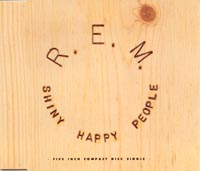
"Shiny Happy People" is a song by the American rock band R.E.M., released as the second single from their seventh studio album, Out of Time (1991). It features guest vocals by Kate Pierson of the B-52's, who also appears in the music video.

"Everybody Hurts" is a song by American rock band R.E.M. from their eighth studio album, Automatic for the People (1992), and released as a single in April 1993 by Warner Bros. Records. It peaked at number 29 on the US Billboard Hot 100, but fared much better on the US Cash Box Top 100, where it peaked at number 18. The song also reached the top 10 on the charts of Australia, Canada, France, Iceland, Ireland, the Netherlands, and the United Kingdom. Its music video was directed by Jake Scott and filmed in San Antonio, Texas. In 2003, Q ranked "Everybody Hurts" at number 31 on their list of the "1001 Best Songs Ever", and in 2005, Blender ranked the song at number 238 on their list of "Greatest Songs Since You Were Born".

"Jetstream" is the thirtieth single by English band New Order. Released through Warner Bros. Records on 16 May 2005, it is the second single to be taken from their eighth studio album, Waiting for the Sirens' Call (2005). The song features Scissor Sisters member Ana Matronic on additional vocals. "Jetstream" charted at number 20 in the United Kingdom and number 30 in Ireland. The music video for the song is the first to feature the band since 1993's "World ".
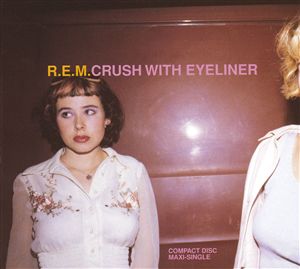
"Crush with Eyeliner" is a song by American rock band R.E.M., released by Warner Bros. Records as the third single from their ninth studio album, Monster (1994). Sonic Youth's Thurston Moore provides background vocals. Michael Stipe claims the song was inspired by the band New York Dolls, who, in his opinion, "knew how to exaggerate a song, to make it sound really sleazy and over the top." This was also one of the first songs that surfaced from Stipe after the writer's block that hounded him after the death of his friend, actor River Phoenix.

"Bang and Blame" is a song by American alternative rock group R.E.M. It was released as the second single from their ninth studio album, Monster (1994), on October 31, 1994 by Warner Bros. Records. The song was R.E.M.'s last to reach the top 40 on the US Billboard Hot 100, peaking at number 19, and was also their last number-one single on the Billboard Modern Rock Tracks chart. The single reached number one in Canada—R.E.M.'s only single to do so—and peaked inside the top 40 on the charts of Australia, Belgium, Finland, Iceland, Ireland, the Netherlands, New Zealand, and the United Kingdom.

"Tongue" is a song by American rock band R.E.M., released on July 17, 1995 by Warner Bros. Records, as the fifth and final single from their ninth studio album, Monster (1994). The song was only released in the US, UK, and Ireland. In the song, lead singer Michael Stipe performs in falsetto; he has stated on several occasions that the narrator of the song is female. Stipe has also said the track is "all about cunnilingus".

"The Sidewinder Sleeps Tonite" is a song by American alternative rock band R.E.M. It was influenced by the song "The Lion Sleeps Tonight", both in the title of the song and through the song's opening refrain. The band used "The Lion Sleeps Tonight" as the B-side to this song in the U.S. The song was released on R.E.M.'s 1992 album, Automatic for the People, and was later released as a single in February 1993, reaching number one in Iceland, number 13 in Ireland, number 17 in the United Kingdom, and number 29 in New Zealand. Its music video was directed by Kevin Kerslake.

"Drive" is a song by American alternative rock band R.E.M. It is the first track on and the lead single from their eighth studio album, Automatic for the People (1992), and was the first song lead singer Michael Stipe wrote on a computer. "Drive" peaked at number 28 on the US Billboard Hot 100, number one on the Billboard Modern Rock Tracks chart, and number two on the Billboard Album Rock Tracks chart. Internationally, "Drive" became R.E.M.'s then-second-biggest hit on the UK Singles Charts, peaking at number 11, and their biggest hit in Norway until "Supernatural Superserious" in 2008, reaching number three. Elsewhere, the song reached the top 10 in Canada, Ireland, New Zealand, and Switzerland.

"Secret Love" is a song by musical group the Bee Gees. It was released as the lead single from their 19th studio album, High Civilization (1991), on 18 February 1991 by Warner Bros. Records. It is an up-tempo song with a Supremes style similar to the 1986 Diana Ross hit "Chain Reaction", which was also written by the Bee Gees. The single reached the top 10 in several European countries, but was not released as a single in the United States.

"Where Have All the Cowboys Gone?" is a song by American singer Paula Cole. It was released to radio in September 1996 before being physically released on March 25, 1997, as the lead single from her second studio album, This Fire. The song is Cole's only top-ten hit on the US Billboard Hot 100, reaching number eight, and was her first top-ten hit in Canada, where it reached number seven. It was additionally a critical success, earning nominations for three Grammy awards: Record of the Year, Song of the Year, and Best Female Pop Vocal Performance.

"Constant Craving" is a song written by Canadian singer-songwriter k.d. lang and Ben Mink, performed by lang and included on her second solo album, Ingénue (1992). The song was released in the United Kingdom in April 1992 and won lang a Grammy Award in the category for Best Female Pop Vocal Performance in 1993, as well as an MTV Video Music Award for Best Female Video. The accompanying music video was directed by Mark Romanek.

"Can't Stop Lovin' You" is a song by American band Van Halen. It was released in March 1995 as the third single from their 10th album, Balance (1995). The song emerged after producer Bruce Fairbairn asked for a more pop-oriented song. Instead of searching for his archives, Eddie Van Halen decided to write new music from scratch. The song was written by all members of Van Halen and pays homage to Ray Charles' song "I Can't Stop Loving You", particularly in the line where Sammy Hagar sings "Hey Ray, what you said is true..."
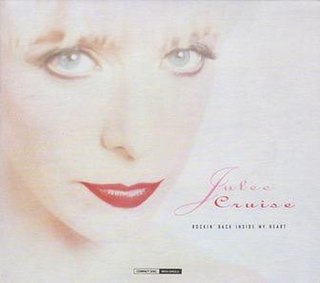
"Rockin' Back Inside My Heart" is a song by American singer, songwriter and actress Julee Cruise, released in 1990 as the second single from her debut album, Floating into the Night (1989). It was released on Warner Bros. Records. Cruise performs the song in "Episode 14" of American mystery serial drama television series Twin Peaks, the long-anticipated episode of the show in which the killer of Laura Palmer was finally revealed after a year of anxious, media-driven anticipation. Cruise also sings "Rockin' Back Inside My Heart" in Industrial Symphony No. 1, another David Lynch project.
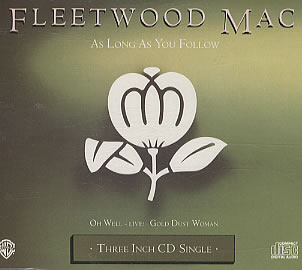
"As Long as You Follow" is a song by British-American rock band Fleetwood Mac. Performed by Christine McVie and written alongside her then-husband, Eddy Quintela, the song was one of two new tracks on the band's 1988 greatest hits album, along with "No Questions Asked". Lead guitarist Rick Vito singled out the guitar solo on "As Long as You Follow" as his best work with Fleetwood Mac.
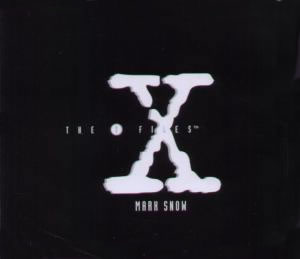
"The X-Files" is an instrumental written and produced by American film and television composer Mark Snow. On its parent album, The Truth and the Light: Music from the X-Files, the track is titled "Materia Primoris". It is a remixed version of the original theme Snow composed for the science fiction television series The X-Files in 1993. The composition was released as a single in 1996 and achieved chart success, particularly in France, where it reached number one on the SNEP Singles Chart. The composition has since been covered by many artists, including DJ Dado and Triple X; DJ Dado's version was a major hit in Europe while Triple X's version reached number two in Australia.

"Nobody's Fool" is a song by English rock band Slade, released in 1976 as the third and final single from their sixth studio album, Nobody's Fools. It was written by lead vocalist Noddy Holder and bassist Jim Lea, and was produced by Chas Chandler. "Nobody's Fool" failed to enter the UK Singles Chart, ending a run of 17 consecutive hits the band had achieved since 1971, but it did reach number 3 in the UK Star Breakers Chart.

"If I Were You" is a song written by Canadian songwriters k.d. lang and Ben Mink and performed by lang. It was the first single released from lang's third studio album, All You Can Eat (1995), by Warner Bros. on 18 September 1995. The single reached number 24 on the Canadian RPM 100 Hit Tracks chart and number four on the RPM Adult Contemporary chart. On the US Billboard charts, the single reached number 15 on the Bubbling Under Hot 100 and was lang's second and final number one on the Hot Dance Club Play chart. Overseas, "If I Were You" peaked at number 23 in Australia, number 50 in New Zealand, and number 53 in the United Kingdom. In 2017, Billboard named "If I Were You" k.d. lang's sixth-best song.

"Days Are OK", also known as "Days Are OK (But the Nights Were Made for Love)", is a song by American new wave band The Motels, which was released in 1980 as the first single from their second studio album Careful. The song was written by Tim McGovern and produced by Carter.
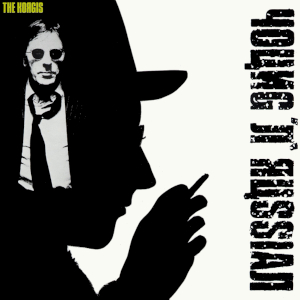
"Young 'n' Russian" is a song by British pop band the Korgis from their self-titled debut studio album. It was released as the band's debut single in February 1979 and, following the UK top 20 success of "If I Had You", was re-issued as a single again in October 1979. The song was written by Andy Davis, James Warren, and Jakki Ridlington, and was produced by Davis and Warren.

"See That Girl" is a song by English singer-songwriter Kirsty MacColl, released on 18 September 1981 by Polydor as the second single from her debut studio album, Desperate Character. It was written by MacColl and produced by Barry "Bazza" Farmer.




















